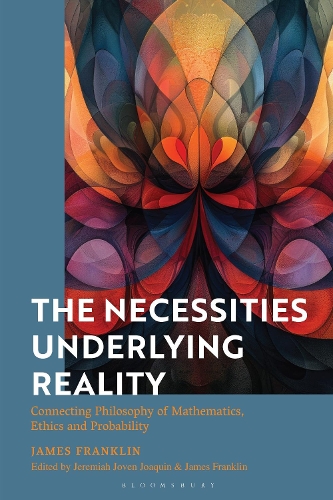
The Necessities Underlying Reality: Connecting Philosophy of Mathematics, Ethics and Probability
(Hardback)
Publishing Details
The Necessities Underlying Reality: Connecting Philosophy of Mathematics, Ethics and Probability
By (Author) Jeremiah Joven Joaquin
Edited by Honorary Professor James Franklin
Bloomsbury Publishing PLC
Bloomsbury Academic
5th March 2026
United Kingdom
Classifications
Professional and Scholarly
Non Fiction
Ancient Greek and Roman philosophy
Physical Properties
Hardback
208
Width 156mm, Height 234mm
Description
The Necessities Underlying Reality brings together four decades of work by the leading Australian philosopher, mathematician and historian of ideas, James Franklin.
These interlinking essays are connected by a core theme: the necessary structures in reality that allow certain knowledge of absolute truths. Franklins Aristotelian realist philosophy of mathematics shows how mathematical truths are directly about physical reality, and at the same time certainly and provably true. Ranging from mathematics to evidence evaluation to ethics, his philosophy of probability sees the relation of evidence to hypothesis, such as in science and law, as purely logical, hence necessary.
Across ethics and the philosophy of religion, the theme of necessity is repeated: basic ethical truths (such as the worth of persons and the wrongness of murder) are shown to have the same certainty as mathematics. Focus on the history of ideas connects the philosophical work in the present with the medieval scholastic tradition, which defended similar necessities but is now neglected.
These carefully selected and edited essays form a coherent introduction to Franklins overall perspective. Recalling Western philosophy to its roots, they reveal the way absolute necessities are discoverable across the abstract fields of mathematics, logical evidence and ethics.
Reviews
As Franklin reminds us, it is a failing of mathematics programs that they typically offer no courses on mathematics. They have courses on algebra, calculus, probability and so on, but no course offering a conspectus of the subject. In The Necessities Underlying Reality, Franklin goes one better. Not only does he explain how necessities underly mathematics in toto, he suggests that it is these same necessities that are key to understanding a much broader range of phenomena. It is a suggestion that is sure to prompt debate. -- Andrew Irvine, Professor of Philosophy, University of British Columbia, Canada
Author Bio
James Franklin is Honorary Professor in the School of Mathematics and Statistics at the University of New South Wales, Sydney, Australia.
Jeremiah Joven Joaquin is Professor of Philosophy at the De La Salle University, Manila, Philippines.
